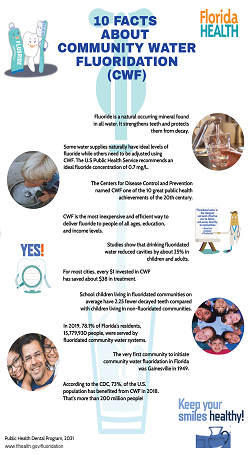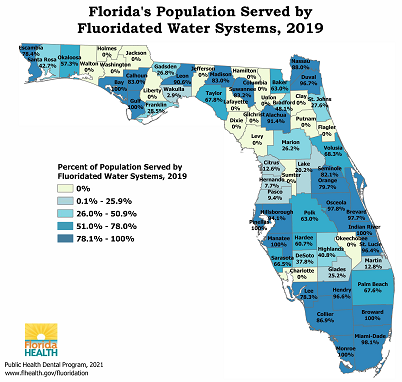It's a New Day in Public Health.
The Florida Department of Health works to protect, promote, and improve the health of all people in Florida through integrated state, county, and community efforts.
Community Water Fluoridation
Contact the Public Health Dental Program
- 850-245-4333
-
Mailing Address
Public Health Dental Program
4052 Bald Cypress Way, Bin A14
Tallahassee, Florida 32399-1724

Community Water Fluoridation
Fluoride is a naturally occurring mineral released from rocks into the soil, water, and air. All water sources such as rivers, lakes, and oceans have varying amounts of fluoride. Fluoride has been shown to decrease the rate of tooth decay or cavities when added to toothpaste or water. The acid that is produced when a person eats makes the tooth weaker and increase the chance of developing cavities. Fluoride helps rebuild and strengthen the weakened tooth’s surface, or enamel, and reverses early signs of tooth decay.
Community water fluoridation is the addition of fluoride to drinking water to increase the natural fluoride level up to the recommended level that prevents tooth decay. By providing constant contact with low concentrations of fluoride, drinking fluoridated water reduces tooth decay by 25% in children and adults. Adding fluoride to the public water supply is one of the most cost-effective method of preventing dental decay with positive effects for everyone of all ages.
Water fluoridation is safe, effective and healthy. The American Dental Association, American Medical Association, American Academy of Pediatrics, World Health Organization, and many other public health, medical, and dental organizations support and recommend community water fluoridation. The Centers for Disease Control and Prevention (CDC) named community water fluoridation one of 10 great public health achievements of the 20th century because of its contribution to the significant decline in cavities in the United States since the 1960s. In 2018, 73% of U.S. population on community water systems had access to fluoridated water according to the CDC.
In 2019, 78.1% of Floridians served by community water systems received fluoridated water. Since 1949 when Gainesville became the first community to initiate water fluoridation, the State of Florida trend has increased steadily to include more and more families gaining access and benefitting from the protective properties of optimally fluoridated water.
Year of initiation for Florida's fluoridated community water systems.
The U.S. Public Health Service recommends an optimal fluoride concentration of 0.7 milligrams/liter (mg/L) in drinking water. State funds and technical assistance are available through the Public Health Dental Program (PHDP) to help Florida communities with initial efforts to authorize fluoridation and start-up costs. If your community is interested in gaining access to fluoridation, please contact the PHDP at dental@flhealth.gov or 850-245-4333.
- Fluoridation Statistics
- Fluoridation Resources
American Academy of Pediatrics’ Campaign for Dental Health ensures that people of all ages have access to the most effective, affordable, and equitable way to protect teeth from decay: community water fluoridation.
American Dental Association’s (ADA) website contains many resources on water fluoridation such as fluoridation facts, fluoride clinical guidelines, research articles on the oral health benefits of fluoride, and fluoridation news and statistics.
American Fluoridation Society (AFS) is a non-profit organization that promotes scientifically-based education about water fluoridation and provides support in communities across the United States.
American Water Works Association (AWWA) is an international, nonprofit, scientific, and educational organization committed to providing total water solutions assuring the effective management of water. The Florida Section of the American Water Works Association (FSAWWA) has over 2,600 members who are provided with the tools and education needed to preserve clean and safe water.
Centers for Disease Control and Prevention (CDC) provides information on the safety and effectiveness of water fluoridation, as well as guidelines, recommendations, and statistics on water fluoridation.
Florida Department of Environmental Protection (DEP) has the primary role of regulating public water systems in Florida under the Source and Drinking Water Program. Its website provides information on Florida’s public water systems and their fluoridation status.
National Cancer Institute (NCI) provides research studies that found no relationship between fluoridated water and cancer.
National Institute of Dental and Craniofacial Research (NIDCR) provides general information on fluoride and dental health, and additional resources.
The British Fluoridation Society is a non-profit organization founded in 1969 to work on improving dental health in the United Kingdom through the introduction of water fluoridation.
World Health Organization (WHO) published an article that details the WHO approach for preventing dental caries or tooth decay through the use of fluoridation.
*Note: This page contains materials in the Portable Document Format (PDF). The free Adobe Reader may be required to view these files.





Connect with DOH